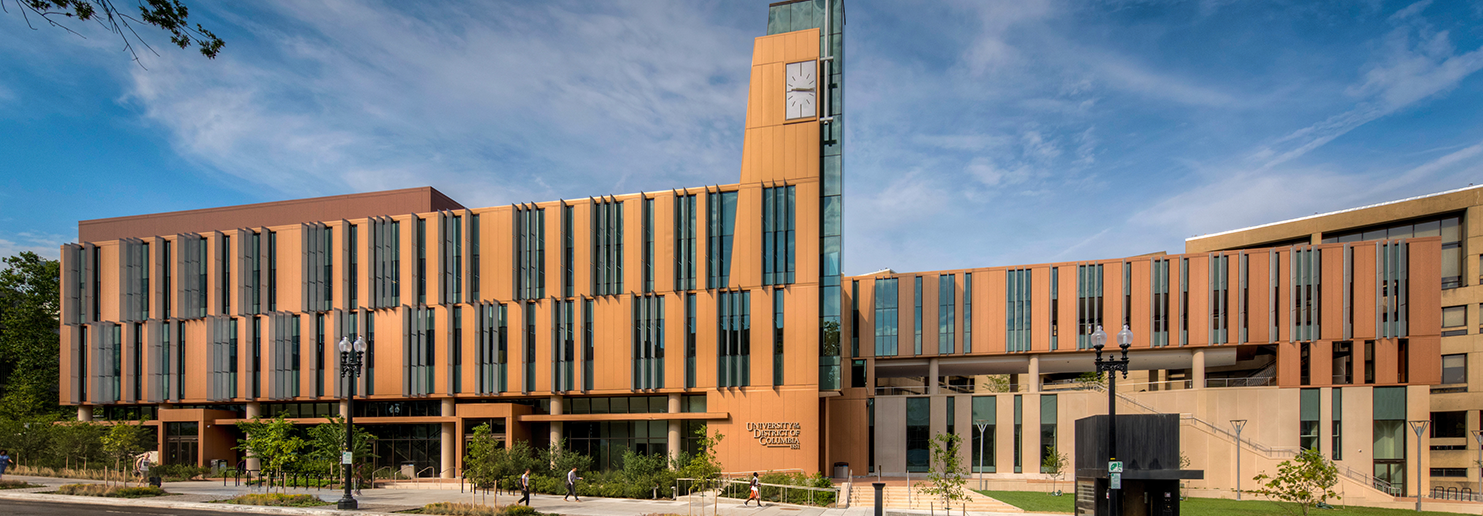Professional Science and Management: The UDC Edge
While other programs focus solely on policy or solely on science, UDC blends policy with hands-on technical skills, giving you the ability to master urban issues and sustainability more comprehensively. You will learn by doing and by putting theoretical concepts to practical use. With concentrations in Urban Agriculture, Urban Sustainability, and Water Resources, the Professional Science Master’s in Water Resources Management will give you the opportunity to learn workplace skills valued by top employers in the green jobs market that is growing at a rapid pace. Our three concentrations in water resources management, urban sustainability, or urban agriculture are supported by our nationally recognized Environmental Quality Testing Laboratory, our innovative UDC Research Farm and its satellite Urban Food Hubs, and by our community-based green infrastructure and social entrepreneurship programs
Professional Science Master’s Degree (PSM) in Water and Resources Management
Whether your interest is in engineering, sciences, policy or business, you may be looking for a way to channel your passion of urban sustainability, urban agriculture or water resources management into a career while making a positive difference. The Professional Science Master’s Degree program concentrations at the University of the District of Columbia prepare you to address the complex issues facing urban communities here in the Washington, DC, area and around the world. The blend of rigorous coursework and extensive field and laboratory experience that our program offers will prepare you well for your chosen career path.
Our interdisciplinary program, based in UDC’s College of Agriculture, Urban Sustainability and Environmental Sciences (CAUSES), provides not only deep knowledge of the physical, chemical and biological sciences applicable to urban systems management, assessment, and monitoring, it will also build your skills in environmental policy, communication, business management, project management, ethics and leadership. This diverse toolkit will uniquely equip you to tackle the challenges of building the sustainable urban communities of the future through a strong focus on food security, food and water safety, resource management, energy efficiency.
PSM students in water resources management, urban sustainability and urban agriculture will:
- Demonstrate effective critical and problem solving skills by applying both qualitative and quantitative approaches.
- Apply advanced statistical and geospatial analytical tools to make informed decisions.
- Demonstrate professionalism with good oral and written communication skills.
- Apply both basic and state-of-the art analytical technologies in determining the quality and sustainability of natural or built environments.
- Apply project management and sustainability concept to plan, execute, monitor and control a project.
- Monitor and assess the impact of urban development on ecosystem health and services
Related:
Curriculum and Requirements
Working professionals who have a bachelor’s degree and a background in business, economics, planning, mathematics, science, or engineering are encouraged to apply to the Professional Science Master’s program in any of the three concentrations. See the general admissions criteria for graduate students. In order to graduate, you must complete a minimum of 35 credit hours, which can be completed in two years of full-time studies, depending on the concentration. The typical course of study includes:
- 16 credit hours of common or professional courses
- 15-16 credit hours of technical or core courses (depending on the concentration)
- 4-credit hours of internship at an employer of field site and a capstone seminar
Core and professional courses may include (16 credit hours):
- Environmental Impact Assessment: Integrated Project
- Sustainable Entrepreneurship
- The Systems Approach and Project Management
- Public Communication for STEM Professionals
- Ethics, Responsible Conduct of Research & Prof Responsibility
- Quantitative and Qualitative Research Methods
- Writing Proficiency Course (depends on GRE score)
Water Resources Management Concentration courses include (15 credit hours, lecture and laboratory):
- Water Quality Assessment, Monitoring & Treatment
- Surface & Groundwater Hydrology
- Water Quality Modeling
- GIS for Water Resource Management
- Stream Restoration
Read more details about the curriculum in the professional science master’s degree program in water resources management.
Urban Agriculture Concentration courses include (16 credit hours lecture and laboratory):
- Water Quality Assessment, Monitoring & Treatment
- Food Production and Agroecology
- Advance Climate Science
- Advanced Sustainable Urban Agriculture
- Contemporary Issues in Nutrition
- Urban Land Use Planning
Urban Sustainability Concentration courses include (16 credit hours lecture and laboratory):
- Food Hubs in Urban Sustainability
- Ecological Economics
- Urban Land Use Planning
- Advanced Climate Science
- Sustainable Design I
- Contemporary Issues in Nutrition
Student Organizations and Activities
Students will have the opportunity to work with our landgrant centers and research facilities including the nationally recognized Environmental Quality Testing Laboratory, our innovative UDC Research Farm in Beltsville, Maryland, our Urban Food Hubs including our 20,000 sq. ft. green roof and East Capitol Urban Farm, the largest urban farm in the District of Columbia.
In addition to the employer-site internships, students will also have the opportunity to participate in University-based internships offered through our five landgrant centers for Urban Agriculture; Urban Sustainability, Nutrition, Diet and Health; Architectural Research; and 4-H and Youth Development. Through these practical learning experiences, PSM students can gain experience in:
- Data collection, analysis and interpretation
- Working in the field and/or laboratory
- Interacting with diverse clients
- Learning how to learn
As part of the internship experience, you will also complete a capstone project and a technical report.
Faculty Spotlight: UDC Water Resources Management Graduate Program
Dr. Todessa Deksissa is the Director of the Water Resources Research and the founder and current Director of the Professional Science Master’s Program in Water Resources Management and the new UDC’s Environmental Quality Testing (EQTL) Laboratory. His research expertise includes: water quality assessment and modeling, emerging contaminants, GIS based modeling of green infrastructure, trace metal analysis in urban soils, fate and transport of organic contaminants in water, modeling integrated urban wastewater system, adaptive water resources management and fostering significant learning in sciences. Dr. Deksissa serves as a member of the Chesapeake Bay Watershed Research and Outreach Collaborative Steering Committee and the emerging contaminant and agriculture working group of Potomac Drinking Water Source Protection Partnership. He is currently spearheads the National Environmental Laboratory Accreditation Conference Certification of the EQTL. Dr. Deksissa is also the co-founder of CAUSES. He earned his Ph.D. in Environmental Technology from Ghent University, Belgium. Contact tdeksissa@udc.edu
Dwane Jones, Ph.D., is the Director of the Center for Sustainable Development and the Coordinator for the PSM concentration in urban sustainability. He is a nationally recognized expert in low impact development. His research interests include complete streets, active transportation, public health, and social interaction in public spaces. He has also taught and conducted research in the areas of water quality management, urban planning and design, low impact development, conservation design, and urban sustainability. The Center for Sustainable Development also includes a world-class water quality research lab as part of its Water Resources Research Institute. Dr. Jones received his Ph.D. in Urban Design from North Carolina State University. Contact:dwane.jones@udc.edu
Dr. Matthew Richardson is the Assistant Director for Urban Agriculture Research, in the Center for Urban Agriculture and Gardening Education and the PSM coordinator of the PSM concentration in urban agriculture. He earned degrees in Biology and Entomology at the University of Delaware before completing his Master’s in Natural Resources and Environmental Sciences and Ph.D. in Ecology, Evolution, and Conservation Biology at the University of Illinois at Urbana-Champaign (UIUC). Prior to joining CAUSES, he was a Postdoctoral Fellow in Crop Sciences at UIUC, a Research Entomologist with the USDA-ARS, and a Research Scientist with the Center for Conservation and Sustainability at the Smithsonian Institution. Dr. Richardson’s main research interests lie in understanding plant-insect relationships in human-managed, disturbed, and restored habitats. His commitment to outreach was recognized with a President’s Volunteer Service Award and a USDA Martin Luther King Jr. Drum Major for Service Award. Contact matthew.richardson@udc.edu




